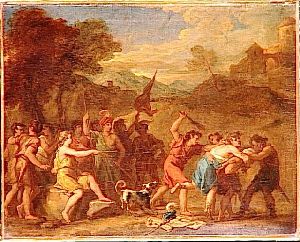Artembares
Appearance

Artembares was a Median nobleman whose son was whipped by a ten-year-old Cyrus. And later, according to Nicolaus of Damascus, he adopted Cyrus as a helper in the Median court. Herodotus recounts:
- When the boy [Cyrus] was in his tenth year, an accident which I will now relate, caused it to be discovered who he was. He was at play one day in the village where the folds of the cattle were, along with the boys of his own age, in the street. The other boys who were playing with him chose the cowherd's son, as he was called, to be their king. He then proceeded to order them about some he set to build him houses, others he made his guards, one of them was to be the king's eye, another had the office of carrying his messages; all had some task or other. Among the boys there was one, the son of Artembares, a Mede of distinction, who refused to do what Cyrus had set him. Cyrus told the other boys to take him into custody, and when his orders were obeyed, he chastised him most severely with the whip. The son of Artembares, as soon as he was let go, full of rage at treatment so little befitting his rank, hastened to the city and complained bitterly to his father of what had been done to him by Cyrus. He did not, of course, say "Cyrus," by which name the boy was not yet known, but called him the son of the king's cowherd. Artembares, in the heat of his passion, went to Astyages, accompanied by his son, and made complaint of the gross injury which had been done him. Pointing to the boy's shoulders, he exclaimed, "Thus, oh! king, has thy slave, the son of a cowherd, heaped insult upon us."
- At this sight and these words Astyages, wishing to avenge the son of Artembares for his father's sake, sent for the cowherd and his boy. When they came together into his presence, fixing his eyes on Cyrus, Astyages said, "Hast thou then, the son of so mean a fellow as that, dared to behave thus rudely to the son of yonder noble, one of the first in my court?" "My lord," replied the boy, "I only treated him as he deserved. I was chosen king in play by the boys of our village, because they thought me the best for it. He himself was one of the boys who chose me. All the others did according to my orders; but he refused, and made light of them, until at last he got his due reward. If for this I deserve to suffer punishment, here I am ready to submit to it."[1]
